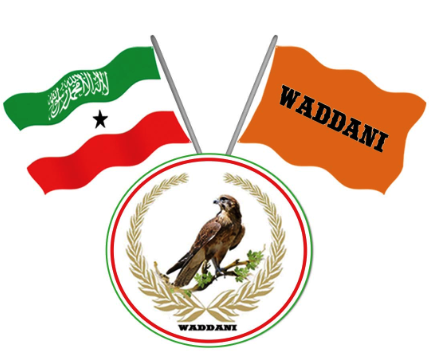

Waddani Party of Somaliland was founded in 2012. Its MPs in Somaliland Parliament belonged to Udub, which was dissolved in 2011 and UCID on whose ticket Waddani Party Chairman secured parliamentary speakership before resigning in 2017.
In a short period of time, Waddani turned out to become a usually progressive party championing, among other causes, rights of minorities, more female MPs, constitutional reform and decentralization. Those themes distinguish it from the ruling party, Kulmiye.
Waddani garnered 40% of votes cast during 2017 presidential elections. That is a remarkable achievement for a party in competition with a well-funded and older party. Many Kulmiye supporters accuse Waddani of undermining Somaliland democratic processes by not agreeing to a timeframe to hold parliamentary elections. The evidence to back up this claim does not hold water. Who should take responsibility for Somaliland not escaping the unflattering assessment by electoral observers that the political system’s weakness lies in being “over-reliant on a customary system to solve problems, and with representative electoral institutions not yet fully capable of supporting the transition to a stronger nation-state.” If Somaliland political parties remain reluctant to observe electoral rules, why should they commit voters to a polarising election cycle yet again?
While on tour in the United Kingdom last year Waddani Chairman, Abdirahman Mohamed Abdullahi, discussed challenges the party is facing of which competing with a ruling party using public resources is the most pressing. Kulmiye took the decision to hold parliamentary and presidential elections separately several years ago. The party leadership might have reasoned, without explicitly stating, that 2017 presidential elections could split the electorate along clan lines.
Waddani’s political programme based on decentralization and accountability chimed with constituencies not allied with the party chairman clan-wise.

Without substantive changes to electoral rules, Waddani will find it hard to justify to its supporters the democratic necessity to hold parliamentary elections. Any changes to electoral rules should not leave citizens in doubt that Kulmiye will not abuse its mandate to deepen distrust caused by misuse of public resources for political ends. The presidential system of Somaliland is not based on the percentage of votes won by a ruling party to form a majority government. A ruling party can govern without holding an absolute majority of parliamentary seats. In the last 2005 parliamentary elections Kulmiye, then an opposition party won 28% of seats but 49.50 % of votes cast during 2010 presidential elections. The democratic deficit in Somaliland institutions benefits Kulmiye.
Reflecting on how democracy fared in East European countries Professor Mark Lilla said that political elites had put in place democratic institutions without democratic citizens. Election observers’ observations on the mismatch between democratic institutions and reliance upon a customary system in Somaliland bears out Professor Lilla’s judgement.
In a 1986 Time magazine essay the late editor-in-chief Henry Grunwald summed up the logic of democracy: If I rob my neighbor today, he will rob me tomorrow. My neighbour’s possessions are just as important as public resources to which we both contribute to ensuring delivery of many services including the administration of justice. This common understanding constitutes one of the foundations of democracy.
Somaliland political institutions are at a crossroads. Waddani may not give in to pressure from Kulmiye to agree to a parliamentary elections schedule. If it does, there is no guarantee that Waddani will not win 40% of parliamentary seats. If Somaliland were governed on the basis of seats won during 2005 parliamentary elections a coalition government would have been in place by now. Kulmiye exploited ambiguities after the dissolution of Udub, the party it unseated in 2010. Kulmiye has increased the number of its MPs who haven’t won a seat on the party’s ticket.
Kulmiye’s goal to perpetuate the dysfunctional Somaliland political system through parliamentary elections without addressing causes of democratic deficit and polarisation gives Waddani reasons to stand back and reflect on a failing political experiment. At a question and answer session of a public lecture given by Professor Ahmed Samatar in Hargeysa three weeks ago, a young man posed the following question: how can the practice of giving jobs and other opportunities to less competent candidates be curbed? Professor Samatar, who is a Kulmiye party member but is critical of the direction taken by the Somaliland government, did not answer it.
Liban Ahmad
libahm@gmail.com
The ideas, conclusions and recommendations of an opinion article in Somaliland.com are solely those of its author(s), and do not reflect the views of the Institution, its management, or its other scholars.
more recommended stories
 A Celebration, a Surprise, and a Strategic Masterstroke: How Somaliland’s Irro Quietly Redirected Lasanod’s Political Hopes
A Celebration, a Surprise, and a Strategic Masterstroke: How Somaliland’s Irro Quietly Redirected Lasanod’s Political HopesBy Mohammed Yasin Omar LASANOD, SOMALILAND.
 The Imminent Collapse of SSC-Khaatumo: A Militia Administration at the Brink of Extinction
The Imminent Collapse of SSC-Khaatumo: A Militia Administration at the Brink of ExtinctionSSC-Khaatumo, the eastern Sool region administration,.
 Somaliland’s Statehood: Rooted in History, Built on Stability – Presidential Spokesperson
Somaliland’s Statehood: Rooted in History, Built on Stability – Presidential SpokespersonHargeisa (Somaliland.com):- The Spokesperson of the.
 President Irro’s Landmark Visit to UAE: A Diplomatic and Economic Win for Somaliland. Dubai, UAE – Somaliland’s Diplomatic Breakthrough
President Irro’s Landmark Visit to UAE: A Diplomatic and Economic Win for Somaliland. Dubai, UAE – Somaliland’s Diplomatic BreakthroughBy: Abdi Jama President Dr. Abdirahman.


Leave a Comment